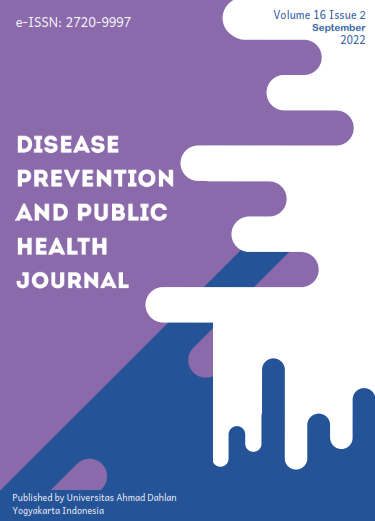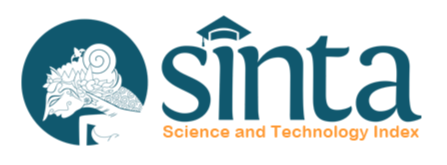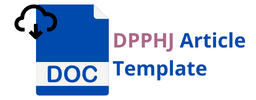Knowledge of Public Environmental Health with Covid-19 Prevention Behavior at the Jalan Gedang Public Health Center Bengkulu City
DOI:
https://doi.org/10.12928/dpphj.v16i2.4957Keywords:
Covid-19, Behavior, Enviromental healthAbstract
Background: The highest spread of Covid-19 cases in 9 sub-districts in Bengkulu City was Gading Cempaka District, with 86 positive cases, 46 recovered, and 3 died. People do not comply with health and personal hygiene protocols such as washing hands and using masks, do not behave in a healthy life, and lack public awareness in maintaining environmental cleanliness. In addition, the community still litters in several places and lacks knowledge and understanding of clean water and household waste management properly. This study aimed to determine the relationship between public environmental health knowledge and Covid-19 prevention behavior in the Working Area of Jalan Gedang Health Center, Bengkulu City. Method: The design used in this research is quantitative research using a cross-sectional approach. This research took place in the area of Jalan Gedang Health Center, Bengkulu City. This research was conducted in January – February 2021. The population was 15,726 people; a sample of 40 people was taken from the minimum sample calculation using a simple random sampling technique. The process of collecting data using a questionnaire and analyzed by univariate and bivariate. Results: The results showed that respondents with good knowledge were 21 people (55%) and 19 people (45%). There is a significant relationship between environmental health knowledge and community behavior toward preventing Covid-19 in the Jalan Gedang Health Center Work Area, Bengkulu City. The results showed p-value (0.001) > 0.05, OR = 7.500 with 95% CI (1.798-31.283). This means that knowledgeable respondents are 7.5 times less likely to behave less well in preventing Covid-19 compared to well-informed respondents. Conclusion: Environmental health knowledge has a significant relationship with Covid-19 prevention behavior. Researchers advise the public to always maintain a clean environment and live a healthy life to avoid the transmission of the Covid-19 disease.
References
Kemenkes R. Keputusan Menteri Kesehatan Republik Indonesia Nomor HK.01.07/MenKes/413/2020 Tentang Pedoman Pencegahan dan Pengendalian Corona Virus Disease 2019 (Covid-19). MenKes/413/2020. 2020;2019:207.
Handayani D, Hadi DR, Isbaniah F, Burhan E, Agustin H. Corona Virus Disease 2019. J Respirologi Indones. 2020;40(2):119–29. Doi: https://doi.org/10.36497/jri.v40i2.101
WHO, UNICEF. Air, Sanitasi, Higiene, dan Pengelolaan Limbah yang Tepat Dalam Penanganan Wabah COVID-19. World Heal Organ [Internet]. 2020;1–10. Available from: https://www.who.int/docs/default-source/searo/indonesia/covid19/who-unicef---air-sanitasi-higiene-dan-pengelolaan-limbah-yang-tepat-dalam-penanganan-wabah-Covid-19.pdf?sfvrsn=bf12a730_2
Napoli C, Fabiani M, Rizzo C, Barral M, Oxford J, Cohen JM, et al. Assessment of Human Influenza Pandemic Scenarios in Europe. Eurosurveillance [Internet]. 2015;20(7):1–10. Available from: http://dx.doi.org/10.2807/1560-7917.ES2015.20.7.21038
Napoli C, Riccardo F, Declich S, Dente MG, Pompa MG, Rizzo C, et al. An Early Warning System Based on Syndromic Surveillance to Detect Potential Health Emergencies Among Migrants: Results of A Two-Year Experience in Italy. Int J Environ Res Public Health. 2014;11(8):8529–41. Doi: https://doi.org/10.3390/ijerph110808529
Siddiqui AA, Alshammary F, Amin J, Rathore HA, Hassan I, Ilyas M, et al. Knowledge and Practice Regarding Prevention of COVID-19 among the Saudi Arabian population. Work. 2020;66(4):767–75. Doi: https://doi.org/10.3233/wor-203223
World Health Organization. Covid-19 Situation Report. World Heal Organ. 2020;31(2):61–6.
Zvolensky MJ, Garey L, Rogers AH, Schmidt NB, Vujanovic AA, Storch EA, Buckner JD, Paulus DJ, Alfano C, Smits JAJ, O'Cleirigh C. Psychological, Addictive, and Health Behavior Implications of the COVID-19 Pandemic. Behav Res Ther. 2020 Nov;134:103715. doi: 10.1016/j.brat.2020.103715. Epub 2020 August 27. PMID: 32891956; PMCID: PMC7451060.
Public Health England. Disparities in the Risk and Outcomes of COVID-19. PHE Publ [Internet]. 2020;89. Available from: https://www.gov.uk/government/publications/Covid-19-review-of-disparities-in-risks-and-outcomes
Mansoorian M, Noori R, Khosravan S, Tabatabaeizadeh SA, Khajavian N. Knowledge, Attitude and Behaviours Regarding Coronavirus Disease 2019 among Residents of Gonabad, Iran. Public Health Nutr. 2021 Apr;24(5):1088-1094. doi: 10.1017/S1368980021000033. Epub 2021 January 11. PMID: 33427193; PMCID: PMC7870909.
Yıldırım M, Güler A. COVID-19 Severity, Self-efficacy, Knowledge, Preventive Behaviors, and Mental Health in Turkey. Death Stud [Internet]. 2020;0(0):1–8. Available from: https://doi.org/10.1080/07481187.2020.1793434
Koletsi P, Antoniadi M, Mermiri D, Koltsida G, Koukou D, Noni M, Spoulou V, Michos A. A Toddler Diagnosed with Severe Postinfectious Bronchiolitis Obliterans and COVID-19 Infection. Pediatr Pulmonol. 2021 Jul;56(7):2381-2384. doi: 10.1002/ppul.25436. Epub 2021 May 4. PMID: 33945679; PMCID: PMC8242384.
Abdel Wahed WY, Hefzy EM, Ahmed MI, Hamed NS. Assessment of Knowledge, Attitudes, and Perception of Health Care Workers Regarding COVID-19, A Cross-Sectional Study from Egypt. J Community Health [Internet]. 2020;45(6):1242–51. Available from: https://doi.org/10.1007/s10900-020-00882-0
Yanti B, Wahyudi E, Wahiduddin W, Novika RGH, Arina YMD, Martani NS, et al. Community Knowledge, Attitudes, and Behavior Towards Social Distancing Policy As Prevention Transmission of Covid-19 in Indonesia. J Adm Kesehat Indones. 2020;8(2):4. Doi: https://doi.org/10.20473/jaki.v8i2.2020.4-14
Khasawneh AI, Humeidan AA, Alsulaiman JW, Bloukh S, Ramadan M, Al-Shatanawi TN, Awad HH, Hijazi WY, Al-Kammash KR, Obeidat N, Saleh T, Kheirallah KA. Medical Students and COVID-19: Knowledge, Attitudes, and Precautionary Measures. A Descriptive Study From Jordan. Front Public Health. 2020 May 29;8:253. doi: 10.3389/fpubh.2020.00253. PMID: 32574313; PMCID: PMC7274076.
Tizaoui K, Zidi I, Lee KH, Ghayda RA, Hong SH, Li H, et al. Update of the Current Knowledge on Genetics, Evolution, Immunopathogenesis, and Transmission For Coronavirus Disease 19 (Covid-19). Int J Biol Sci. 2020;16(15):2906–23. Doi: https://doi.org/10.7150/ijbs.48812
Yanti NPED, Nugraha IMADP, Wisnawa GA, Agustina NPD, Diantari NPA. Public Knowledge about Covid-19 and Public Behavior During the Covid-19 Pandemic. J Keperawatan Jiwa. 2020;8(4):491. Doi: https://doi.org/10.26714/jkj.8.4.2020.491-504
Zhong BL, Luo W, Li HM, Zhang QQ, Liu XG, Li WT, et al. Knowledge, Attitudes, and Practices towards COVID-19 among Chinese Residents During the Rapid Rise Period of the COVID-19 Outbreak: A Quick Online Cross-Sectional Survey. Int J Biol Sci. 2020;16(10):1745–52. Doi: https://doi.org/10.7150/ijbs.45221
Guzek D, Skolmowska D, Głabska˛ D. Analysis of Gender-Dependent Personal Protective Behaviors in A National Sample: Polish Adolescents' Covid-19 Experience (Place-19) Study. Int J Environ Res Public Health. 2020;17(16):1–22. Doi: https://doi.org/10.3390/ijerph17165770
Alsoufi A, Alsuyihili A, Msherghi A, Elhadi A, Atiyah H, Ashini A, et al. Impact of the COVID-19 Pandemic on Medical Education: Medical Students' Knowledge, Attitudes, and Practices Regarding Electronic Learning. PLoS One [Internet]. 2020;15(November 11):1–20. Available from: http://dx.doi.org/10.1371/journal.pone.0242905
Nienhaus A, Hod R. COVID-19 Among Health Workers in Germany and Malaysia. Int J Environ Res Public Health. 2020;17(13):1–10. Doi: https://doi.org/10.3390/ijerph17134881
Meyerowitz EA, Richterman A, Gandhi RT, Sax PE. Transmission of Sars-Cov-2: A Review of Viral, Host, and Environmental Factors. Ann Intern Med. 2021;174(1):69–79. Doi: https://doi.org/10.7326/m20-5008
Gallè F, Sabella EA, Da Molin G, De Giglio O, Caggiano G, Di Onofrio V, et al. Comprension Del Conocimiento Y Los Comportamientos Relacionados Con La Epidemia Por Covid-19 En Estudiantes Universitarios Italianos: Estudio EPICO. Int J Environ Res Public Health [Internet]. 2020;17(10):3481. Available from: https://www.mdpi.com/1660-4601/17/10/3481
Tan SW, Oh CC. Contact Dermatitis from Hand Hygiene Practices in the COVID-19 Pandemic. Ann Acad Med Singapore. 2020;49(9):674–6. Doi: https://doi.org/10.47102/annals-acadmedsg.2020136
Wati N dkk. Gambaran Pneumonia Pada Balita di Kota Bengkulu. Pros Senantias Semin Nas Has Penelit dan Pengabdi Kpd Masy. 2020;1(1):163–70. Available from: http://openjournal.unpam.ac.id/index.php/Senan/article/view/8257
Custodio R, Yuri L, Nakada K. COVID-19 Pandemic : Solid Waste and Environmental Impacts in Brazil. Elsevier. 2020;(January). Doi: https://doi.org/10.1016/j.scitotenv.2020.142471
Zand AD, Heir AV. Emerging Challenges in Urban Waste Management in Tehran, Iran during the COVID-19 pandemic. Resour Conserv Recycl. 2020 Nov;162:105051. doi: 10.1016/j.resconrec.2020.105051. Epub 2020 July 14. PMID: 32834485; PMCID: PMC7359795.
Pappalardo G, Cerroni S, Nayga RM, Yang W. Impact of Covid-19 on Household Food Waste: The Case of Italy. Front Nutr. 2020;7(December):1–9. Doi: https://doi.org/10.3389/fnut.2020.585090
Tonini D, Albizzati PF, Astrup TF. Environmental Impacts of Food Waste: Learnings and Challenges From a Case Study on UK. Waste Manag [Internet]. 2018;76:744–66. Available from: https://doi.org/10.1016/j.wasman.2018.03.032
Zambrano-Monserrate MA, Ruano MA, Sanchez-Alcalde L. Indirect Effects of COVID-19 on the Environment. Sci Total Environ. 2020;728:138813. doi:10.1016/j.scitotenv.2020.138813
Downloads
Published
Issue
Section
License
Copyright (c) 2022 Universitas Ahmad Dahlan

This work is licensed under a Creative Commons Attribution-ShareAlike 4.0 International License.
Authors transfer the copyright and grant the Disease Prevention and Public Health Journal right of first publication with the work simultaneously licensed under a Creative Commons Attribution License (CC BY-SA 4.0) that allows others to share (copy and redistribute the material in any medium or format) and adapt (remix, transform, and build upon the material) the work for any purpose, even commercially with an acknowledgement of the work's authorship and initial publication in Disease Prevention and Public Health Journal. Authors are able to enter into separate, additional contractual arrangements for the non-exclusive distribution of the journal's published version of the work (e.g., post it to an institutional repository or publish it in a book), with an acknowledgement of its initial publication in Disease Prevention and Public Health Journal. Authors are permitted and encouraged to post their work online (e.g., in institutional repositories or on their website) prior to and during the submission process, as it can lead to productive exchanges, as well as earlier and greater citation of published work (See The Effect of Open Access).

This work is licensed under a Creative Commons Attribution-ShareAlike 4.0 International License.







